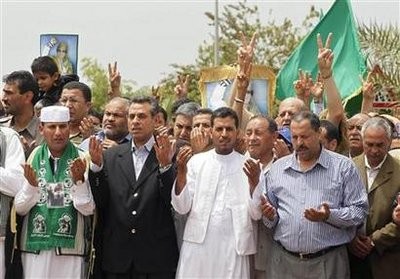Fighting between rebels and forces loyal to Muammar Gaddafi is forcing thousands of refugees to flee western Libya on foot to the Tunisian border and by boat to Europe, the United Nations said on Tuesday.
Rebels said that over 40 Grad rockets had hit the rebel-held town of Zintan in the Western Mountains late on Tuesday, and aid deliveries to the western port of Misrata have been hindered by artillery fire and mines near the harbor entrance.
Rebel spokesmen said fighting had flared again in Misrata's eastern suburbs, but that intense air strikes by NATO planes appeared to have won the port, the city's lifeline, a respite in shelling by forces loyal to the Libyan leader.

In Tripoli, witnesses heard two loud explosions late on Tuesday but there was no explanation of their cause.
Gaddafi, who seized power in a 1969 coup, has not been seen in public since a NATO missile attack on Saturday on a house in Tripoli, which killed his youngest son and three grandchildren.
Deputy Foreign Minister Khaled Kaim said Gaddafi was alive and in good health and had "not at all" been hurt in the NATO strike. "He met today a number of tribal leaders," Kaim said.
Asked when Gaddafi would appear publicly amid questions over whether he survived the blast, Kaim said "This is up to him, his security people ... He has been targeted four times."
Turkish Prime Minister Tayyip Erdogan, in his strongest public comments yet on the power struggle in Libya, said "Gaddafi should step down right away and leave the administration to Libyan people."
"Libya is not the property of a single person or family," Erdogan told a news conference in Istanbul, appealing to Gaddafi to realize how his people were suffering. Erdogan has been urging Gaddafi to quit since early March.
EXODUS FROM MOUNTAINS
The U.N. refugee agency UNHCR said an exodus from the Western Mountains region had resumed, with Libyan families fleeing into southern Tunisia.
"This past weekend, more than 8,000 people, most of them ethnic Berbers, arrived in Dehiba in southern Tunisia. Most are women and children," UNHCR spokesman Adrian Edwards told a news briefing in Geneva. Tens of thousands have already fled.
The Dehiba crossing point has changed hands several times in the last week, with fighting spilling over onto Tunisian soil.
A violent sandstorm that battered the area had made the situation more difficult. "The storm has destroyed hundreds of tents and two huge portable warehouses," Edwards said.
"Most of the Libyan refugees are leaving Libya in tribal groups. Many are choosing to stay in the camps for a few days before moving on to stay with Tunisian families," he said.
Meanwhile, more people have been fleeing Libya by sea to Italy, after a 10-day break due to bad weather.
While a few rebel pockets such as Zintan and Misrata resist Gaddafi's forces in western Libya, in the largely rebel-held east the most pressing need is for cash to try to restore infrastructure and establish a viable administration.
Rebels said they expected billions of dollars in credit soon from Western governments to feed and supply their territories in the east and support their campaign against Gaddafi.
Ali Tarhouni, head of the rebel national council's finance committee, said he expected France, Italy and the United States to extend credit secured against frozen Libyan state assets.
ECONOMY IN TATTERS
With Libya's economy in tatters after more than two months of civil war, funds to pay for food, medicine and the state salaries on which most people depend are running low.
"We are still discovering different segments that need to be paid that we thought were paid," Tarhouni told reporters in the eastern rebel stronghold of Benghazi.
"At every single moment another need arises in terms of food, medicine and people who are injured," he said. "I need about $2-3 billion and we are hoping to get most or all this."
British Foreign Secretary William Hague said the countries in the Libya 'contact group' would discuss establishing a temporary financial mechanism at talks in Rome this week.
British Prime Minister David Cameron told parliament there were "opportunities for tightening sanctions over things like oil and oil products to make sure this regime ... realizes it cannot go on terrorising its own people."
President Nicolas Sarkozy told the French weekly L'Express that France planned to organize a conference of "friends" of Libya, including defectors and various political groups, to try to build a political solution.
The insurgents had hoped for a swift overthrow of Gaddafi but his better-trained and better-equipped forces halted the westward rebel advance from their stronghold of Benghazi and forced a stalemate in the fighting.
The International Organization for Migration said an aid ship was still waiting off Misrata for mines to be cleared before it delivered supplies and evacuated foreigners and wounded Libyans. NATO said its minesweepers had destroyed two mines laid by government forces and were searching for a third.
























